

The H5P PB Kitchen – Cooking with H5P & Pressbooks. COVID: we can’t fix everything, and that should be OK. (108) Podcast episode#3 Teresa McKinnon. Open Practice in Practice. Last week I had the pleasure of running a workshop on open practice with Catherine Cronin as part of City University of London’s online MSc in Digital Literacies and Open Practice, run by the fabulous Jane Secker.
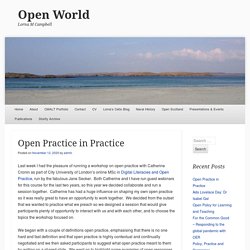
Both Catherine and I have run guest webinars for this course for the last two years, so this year we decided collaborate and run a session together. Catherine has had a huge influence on shaping my own open practice so it was really great to have an opportunity to work together. We decided from the outset that we wanted to practice what we preach so we designed a session that would give participants plenty of opportunity to interact with us and with each other, and to choose the topics the workshop focused on. We then gave participants an opportunity to choose what they wanted us to focus on from a list of four topics: 403 Forbidden. Arcsmodel-prototype. It is dangerous to use the phrase "most people," but nevertheless, I am going to say that most people can get into ruts.
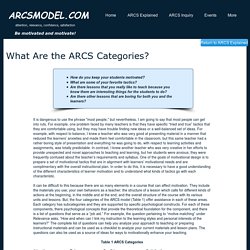
For example, one problem faced by many teachers is that they have specific “tried and true” tactics that they are comfortable using, but they may have trouble finding new ideas or a well-balanced set of ideas. For example, with respect to balance, I knew a teacher who was very good at presenting material in a manner that reduced the learners’ anxieties and made them feel comfortable in the classroom, but this same teacher had a rather boring style of presentation and everything he was going to do, with respect to learning activities and assignments, was totally predictable. In contrast, I knew another teacher who was very creative in her efforts to provide unexpected and novel approaches to teaching and learning, but her students were anxious; they were frequently confused about the teacher’s requirements and syllabus.
Table 1 ARCS Categories Keller, J. Keller, J. An Affinity for Asynchronous Learning. There is something that bothers us about conversations about replacing face-to-face teaching with online learning: they often fall into a trap of assuming that incorporating synchronous interaction is the optimal way to make learning more personable, that it approximates the face-to-face setting closest, and is therefore preferable and better.
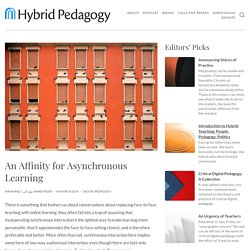
How much ‘work’ should my online course be for me and my students? – Dave’s Educational Blog. How much work is too much (or too little) work for my students?
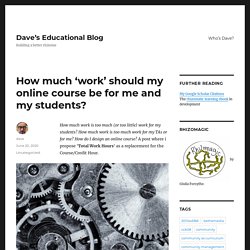
How much work is too much work for my TAs or for me? How do I design an online course? A post where i propose ‘Total Work Hours‘ as a replacement for the Course/Credit Hour. As we leave behind the emergency teaching processes that have spurred the development of online courses for end-of-term winter and OMG-summer courses the questions I’m hearing are changing. Webinar 4 and 5 now available – UK Copyright Literacy. Last week was Easter break in the UK but we set up a new page listing all the webinars in our series Copyright, Fair Dealing and Online Teaching in a time of crisis.
It meant we didn’t get around to writing a blog post about the recording and slides being available from webinar 4 which are also listed on the above page. Last week saw some much welcomed news for the higher education community from the Copyright Licensing Agency (CLA) about an increase in the extent limits from 10-30% (or three chapters) on an opt-in basis. James Bennett joined us on the webinar and shared hot off the press news. The requirement for an institution to own a copy of a title has also been relaxed for the duration of the crisis.
Recommendations – OpenMed. Recommendations from OpenMed to University leaders and policy makers for opening up Higher Education in the South-Mediterranean by 2030 Based on our journey within the OpenMed project, we have designed a set of recommendations to University leaders and policy makers for opening up Higher Education in the South-Mediterranean by 2030.
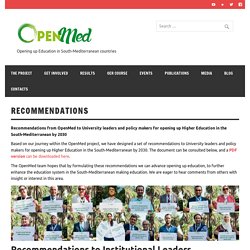
The document can be consulted below, and a PDF version can be downloaded here. The OpenMed team hopes that by formulating these recommendations we can advance opening up education, to further enhance the education system in the South-Mediterranean making education. Reuse the Course – OpenMed. The OpenMed Course is one of the main outputs of the project.
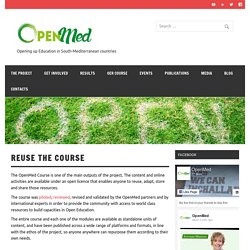
The content and online activities are available under an open licence that enables anyone to reuse, adapt, store and share those resources. The course was piloted, reviewed, revised and validated by the OpenMed partners and by international experts in order to provide the community with access to world class resources to build capacities in Open Education. The entire course and each one of the modules are available as standalone units of content, and have been published across a wide range of platforms and formats, in line with the ethos of the project, so anyone anywhere can repurpose them according to their own needs.
The content of the course has been released as both PDF and Word files. View of The Historical Development and Adaptation of Open Universities in Turkish Context. New UNESCO Recommendation will promote access to educational resources for all. An important step was taken towards quality education and access to information for all, as UNESCO’s General Conference adopted today a Recommendation on Open Educational Resources (OER).
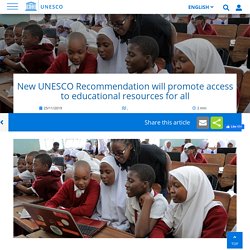
This new Recommendation will support the development and sharing of openly licensed learning and teaching materials, benefitting students, teachers and researchers worldwide. The National Forum Open Licensing Toolkit - National Forum for the Enhancement of Teaching and Learning in Higher Education. Groups – Language OER Network. Recording lectures: legal considerations. Digital Accessibility – from Directive to DNA. Combining CC Licenses – Faculty OER Toolkit. Wiki/cc license compatibility. Creative Commons licenses are designed for ease of use. Users can see in a transparent manner how your work is available for reuse. Things can become complicated however if you want to combine two Creative Commons licensed works, for example when making a collage or remixes of music. Not all licenses are in fact to compatible. In the chart below we show which licenses are compatible. Choose two works you wish to combine or remix.
It is not possible to mix works where the first work is placed under a Creative Commons Attribution-Share Alike license and the second work is licensed under a Attribution-NonCommercial-ShareAlike license. Capital, Neoliberalism and Educational Technology. I have been asked by experienced colleagues what neoliberalism means and why it is relevant in educational technology.
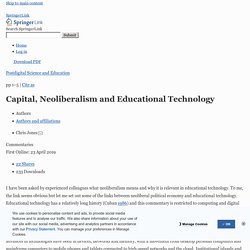
To me, the link seems obvious but let me set out some of the links between neoliberal political economy and educational technology. Educational technology has a relatively long history (Cuban 1986) and this commentary is restricted to computing and digital technologies in education. Currently, digital technologies are established features throughout education. Indeed, the core digital presence of many educational institutions is the Learning Management System (LMS) (Virtual Learning Environment, or VLE, in the UK). About education and training in the EU. EU copyright reform: why educators and citizens should worry. Joining an OER Community: Introduction to OER for Language Teachers.
We hope you keep in touch with COERLL on TwitterLinks to an external site. and FacebookLinks to an external site..
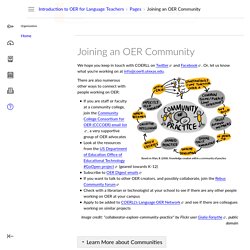
Or, let us know what you're working on at info@coerll.utexas.edu. There are also numerous other ways to connect with people working on OER: If you are staff or faculty at a community college, join the Community College Consortium for OER (CCCOER) email listLinks to an external site., a very supportive group of OER advocates Look at the resources from the US Department of Education Office of Educational Technology #GoOpen projectLinks to an external site. (geared towards K-12)Subscribe to OER Digest emailsLinks to an external site.
January Jamboree 2019 – Desert of My Real Life. I have been meaning to write a post about Plymouth State University’s January Jamboree event but January and now 10 days of February have slipped by me.
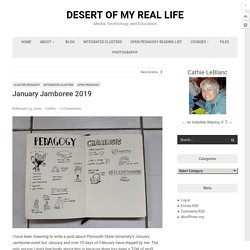
The only reason I don’t feel badly about this is because there has been a TON of stuff going on related to General Education and the Integrated Cluster Initiative. I’ll write about that in my next post. In this one, I want to summarize the sessions I attended at January Jamboree. The focus of this year’s Jan Jam was “cluster pedagogy.” The first session was a keynote by Robin DeRosa. Make ANY Meme EU Compliant! First Nations art and dance, a new campus, and moving to sustainable open education: a short report on the ETUG Fall Workshop.
I apologise for the lack of blog posts these last couple of months. I have been busy analysing and writing up data on course enrolments for the national survey. Informal Learning – Foundations of Learning and Instructional Design Technology. In today’s digitally connected world we are constantly acquiring new personal knowledge and skills, discovering new methods of work and ways to earn a living, solving problems, and changing the way we create, access and share information, through informal learning. The topic of informal learning can be discussed in many different contexts and from a variety of theoretical perspectives. Empathy, Trust, and Story: a How To? Close. Get close. United Nations Sustainable Development Goals Open Pedagogy Fellowship. Why is innovation in teaching in HE so difficult? 4. Integrating online and distance learning into the mainstream.
Ontario Extend. Open Pedagogy Notebook. Google, ISTE, and the Death of EdTech. ISTE ‘18 was all abuzz with imminent news of a major announcement from Google. This, the Google foot soldiers proclaimed, was going to be the most transformative thing to happen Google Classroom since its launch. #HumansOfCopyright: Interview with David Lopez, Lifelong Learning Platform – Copybuzz. Alongside threats from the upload filter (Article 13), the snippet tax (Article 11), and the limits on text and data mining (Article 3), there’s another part of the proposed Copyright Directive that has serious problems. Open Education Action Plan Template. OpenMed Video Collection – Audiovisual OER produced for the OpenMed Project.
Are Innovative Teachers Happier? Edutopia. The Faculty Perspective on OER Creation - NACS > Home > Publications > Campus Marketplace e-Newsletter > News. “Whenever we talk about the intersection of technology and education, the discourse is almost always hyperbolic,” Ben Wright, assistant professor of historical studies, University of Texas at Dallas, said as a panelist in Taking OER Mainstream, a Course Materials eXperience Focus Session at CAMEX 2018 in Dallas, TX. A fool's errand. Objections to the Creative Commons attribution licence are straw men raised by parties who want open access to be as closed as possible, warns John Wilbanks. Copyright licensing is a topic usually left to law review articles, or obscure terms of service on websites, or agreements between publishers and libraries. But it is an essential element of the move towards open access — the free, immediate online availability of scholarly articles coupled with the right to use them fully in the digital environment.
Teacher development is neglected in internationalisation. Attention UWN newsletter subscribers: Due to the new EU General Data Protection Regulation (GDPR), we may need you to re-confirm your subscription to our newsletter. An email notice will be sent out this coming week that we request that you respond to as soon as possible.
Failure to respond to the notice may result in you not receiving the newsletter after 25 May 2018. Do teaching qualifications contribute to teaching quality? OER, Equity, and Implicit Creative Redlining – Rajiv Jhangiani, Ph.D. The open education movement wants to be a force for equity. Lucy Gray collected this story. Could a new EU benchmark for language learning be a catalyst for increased European cohesion and identity? Dr Michael Byram is Emeritus Professor in the School of Education at Durham University The European Commission’s project to establish a ‘European Education Area’ by 2025 includes several proposals, one of which is putting together a benchmark for (foreign) language learning at the end of upper secondary education.
The Teaching and Learning Center – Graduate Center, City University of New York. Digital Initiatives at the Grad Center. Beyond borders and conference boundaries: Emily Bettison and Hassan Hussain - PGR Studio. Digital diploma mills: The automation of higher education. In recent years changes in universities, especially in North America, show that we have entered a new era in higher education, one which is rapidly drawing the halls of academe into the age of automation. Automation — the distribution of digitized course material online, without the participation of professors who develop such material — is often justified as an inevitable part of the new “knowledge–based” society. It is assumed to improve learning and increase wider access. Top EdTech Update Learning EdTech Content for Week of Feb 10 - Feb 16, 2018. “Adopt fair use” – The Australian Law Reform Commission tells the Australian government! Pablo Servigne : « La loi du plus fort est un mythe.
Education Futures Teacher 3.0: Sharing, creating, and connecting knowledge. FH3 OEB Berlin – Future Happens. Virtual Classrooms are the Future of Teacher Education. Reframing the ‘Progressive’ vs. ‘Traditionalist’ Debate in Education. OER Commons. If We Talked About the Internet Like We Talk About OER: The Cost Trap and Inclusive Access. Elite universities strive for inclusivity – but only up to a point. When filters fail: These cases show we can’t trust algorithms to clean up the internet. Inclusive content creation - Accessible Organisations. Image Collector SPLOT. “Eton for all”: will robot teachers mean everyone gets an elite education? Is the "major" review of HE Commission:Impossible? 'I dreamt of being a teacher since I was a child. But now, as I resign, I feel lied too'
'Teaching is a rewarding profession - there is always room for improvement' Inclusive content creation - Accessible Organisations. The Mystery of Good Teaching. Repositories of Open Educational Resources: An Assessment of Reuse and Educational Aspects. 5 Invisible Barriers Preventing Change in Higher Ed. Why EdTech Sucks – Learning {Re}imagined – Medium. #15toptips for Student-Centred Teaching 10: Build into your modules or courses a ‘negotiated learning’ element that enables students to align their studies – at least in part – with their enthusiasms. They will be more engaged, will learn more, and produc. Developing students' digital literacy. Business models, MOOCs and disruptive innovation. On Workload. We The Educators — a personal perspective – Learning {Re}imagined – Medium. One business case for OER examined.
When Does Service Become Scholarship? RE-ENVISIONED. When Does Service Become Scholarship? Creative teaching in the age of austerity. Children with special needs are being turned away from 'underfunded' state schools, councils report - Schools Improvement Net. Stop school funding cuts - All Our Children Deserve a Great Education. Government misses teacher recruitment target for fifth consecutive year - by a lot - The London Economic. The Financial Sustainability of Schools inquiry. OER risks: why not being open now costs us money in the future. – Melissa Highton. The Dangers of Knowing A Little: Pseudo-Journalism and Education Discourse. Openness, a practice for innovation in higher education – E-Learn. Three quarters of the public think teachers contribute greatly to society’s wellbeing, poll shows. 'We must cherish our professional status as teachers' Bob Awesome collected this story.
Teacher shortage getting worse, say MPs. Sir Ken Robinson: Bring on the learning revolution! He who pays the piper – Distant Ramblings on the Horizon. #15toptips for Student-Centred Teaching 1: Trust your students and they will trust you. Demand for Digital Courseware Is Higher Than Supply, Survey Says. Open leadership involves becoming a master of balance.
Future Teacher – Just another thinking.is.ed.ac.uk site. What is the meaning of free? – Enrichmentality. Paris's École 42 University wants to launch the next Zuckerberg.